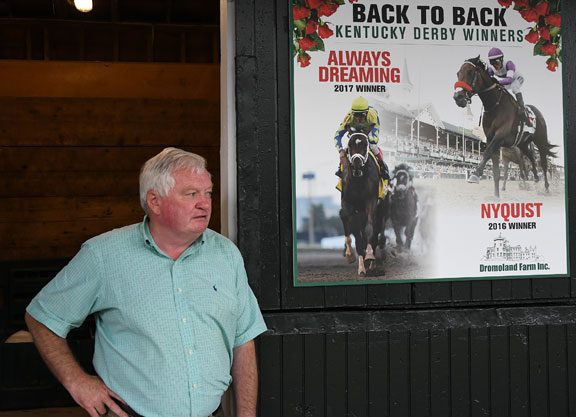By Chris McGrath
He's out there right now, hiding in plain sight. Very possibly running today; otherwise, last weekend or the next one. Yet even from the few animals retaining real credibility–by now perhaps no more than three or four dozen–not many of us would feel terribly confident about naming the 146th winner of the Kentucky Derby. So let's just take a moment to reflect again how extraordinary was the man who was able to sieve the 142nd and 143rd winners from crops of 11,000-12,000 (and that's just colts) foaled in North America in 2013 and 2014.
The abrupt death of Gerry Dilger, at just 61, is a savage shock to our community. He wasn't even one of those guys you only really appreciate when they're gone. Nobody needed the jolt of bereavement to know how indispensable was that beady Irishman among the Bluegrass cast of characters.
We all know horsemen whose eyes disclose the icy detachment on which their shrewdness is founded. But Gerry's were no less warm than they were acute. For everyone who knew him, everyone who cherished him–and these are essentially coterminous groups–it's going to be a long time before we become accustomed to going through the barns, at any major sale, and somehow never finding Gerry.
There will, of course, still be many other seasoned horsemen around, who will be just as generous with their experience and counsel. But it's going to be like instinctively leaning on a shedrow rail, as somewhere secure to rest the weight of our concerns or questions, only to pitch forward into an unexpected void. We'll get up, dust ourselves down. But it'll happen at the next sale, too.
Happily, that personal legacy, in the memories and affection of his peers, will also endure among those who never met Gerry; in the annals of a sport that will forever marvel that an operation as modest as Dromoland Farm should have pinhooked Nyquist (Uncle Mo) and co-bred/raised Always Dreaming (Bodemeister).
How does something like that happen? Gerry, needless to say, ascribed it to pure luck. “I'm no better than the man next door,” he insisted. “I got lucky. Put it down to hard work, whatever, but I got lucky. I'm no better than any of my buddies in town.”
These will hear exactly the tone in which Gerry spoke those words. Not a quiver of false modesty. Instead, something closer to outrage than astonishment, that fate should have favored him in such a way that people he esteemed might be invited–at least by those who knew no better–to look up to him in some way.
The reality, of course, is that they all did so already. They didn't need this blaring signpost to the genius he had absorbed from horsemen of the old school (“herdsmen”, he called them) like his mentor Tony Butler. No manuals, no systems, no software. Just an instinct developed through long exposure–day and night, sleet or sun–to the mute, infinitesimal signals legible in a horse: in its manger, or the condition of its hide, or merely its way of standing.
As such, then, not even Gerry could really believe that all horsemen are created equal. You often hear them attribute professional struggles to simple want of opportunity, and it's true that the quality of raw materials will flatter some, and cause others to be undervalued. But surely most of us acknowledge that some guys are simply that bit better at the job than others.
David Anderson–himself, of course, a pretty good example–believes that the latest star to graduate from his Ontario farm, Hard Not To Love (Hard Spun), would never have fulfilled her potential had she not found her way into the right barn. “I'm convinced that if she was in the hands of anyone other than John Shirreffs, she would probably never have set foot on the track,” confided Anderson recently.
The same may very well have been true of another notoriously quirky lady in Zenyatta (Street Cry {Ire}) herself. Certainly those of us who profoundly admire Shirreffs–a man no less averse to veneration than Gerry Dilger–will be hoping to see his dexterity advertised by Honor A.P. (Honor Code), the brilliant but raw maiden winner he plunges into the GII San Felipe S. Saturday.
It's a gripping race, with Baffert fielding a chalk-and-cheese pair in the extrovert Authentic (Into Mischief) and the ultra-professional Thousand Words (Pioneerof The Nile); and Storm the Court (Court Vision) striving for the respect that should be his due, as champion, after a perfectly respectable effort in the afterburners of another Baffert monster in his sprint comeback. But CRK Stable has named Honor A.P. with an auspicious sense of destiny, his venerable grandsire having died just two weeks ago.
Honor Code was deemed to have made a quiet-enough start with his first juveniles, but that was typical of the ridiculous impatience that bedevils this business. His genes and build and track record all remain just as spectacular as the day he went to Lane's End, and his maturing stock will have many more days like Saturday–when Honor A.P.'s big test is preceded, on the other side of the nation, by a similar examination for another of his highly regarded maiden winners, Market Analysis.
To think that Gerry Dilger was 31 when A.P. Indy was born, and yet would only outlive him by a few days. But both have bequeathed their class to the continued benefit of the breed: A.P. Indy as a sire of sires, and Gerry as a man who educated and encouraged so many in the next generation. (A legacy that is to be aptly extended through the memorial fund.)
After claiming that he had simply “got lucky”, I remember that Gerry did permit himself a mischievous smile and a caveat. Because there was, after all, another side to it: “Everyone else has to get lucky too.” And so were we all, in knowing him.
Not a subscriber? Click here to sign up for the daily PDF or alerts.






